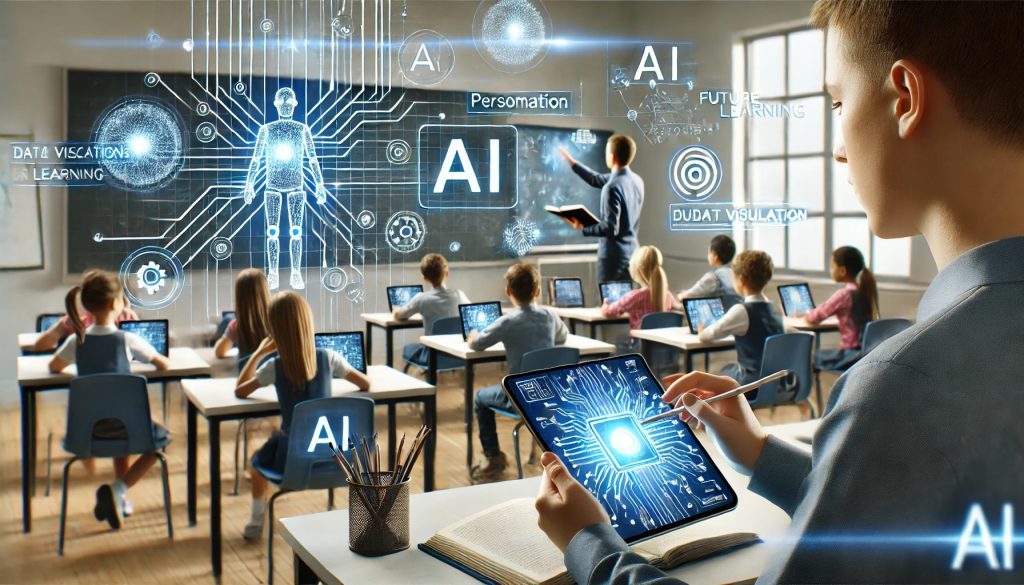Artificial intelligence (AI) is revolutionizing various sectors, and education is no exception. The integration of AI in education is reshaping how students learn, how teachers teach, and how educational institutions operate. As AI continues to evolve, its impact on education is becoming increasingly profound. It offers personalized learning experiences, enhancing administrative efficiency, and expanding access to quality education. Let’s explore the multifaceted role of AI in education and its potential to transform the future of learning.
Personalized Learning Experiences
One of the most significant contributions of artificial intelligence in education is its ability to create personalized learning experiences. Traditional education often follows a one-size-fits-all approach, which may not cater to the individual needs of each student. AI, however, enables the development of adaptive learning systems. The purpose of this is to tailor educational content to a student’s unique learning style, pace, and preferences. These systems analyze data on student performance and behavior, providing customized feedback and recommendations.
Moreover, AI-powered tools can identify gaps in a student’s knowledge and adjust the curriculum accordingly. This level of personalization ensures that students receive the support they need to master concepts before moving on to more advanced material. Personalized learning powered by AI not only enhances student engagement but also improves learning outcomes by addressing each learner’s specific needs.
Enhancing Teacher Effectiveness
AI in education is also playing a crucial role in enhancing teacher effectiveness. By automating administrative tasks such as grading, attendance tracking, and lesson planning, AI allows teachers to focus more on instruction and student interaction. AI-powered grading systems, for example, can quickly assess student assignments, providing instant feedback and reducing the time teachers spend on repetitive tasks.
Additionally, AI can assist teachers in identifying students who may be struggling or excelling, enabling more targeted interventions. For instance, predictive analytics can highlight students at risk of falling behind, allowing teachers to provide timely support. Similarly, AI can suggest resources and strategies for teachers to enhance their instructional methods, ultimately improving the quality of education.
Expanding Access to Education
The potential of AI in education extends beyond the classroom, offering solutions to expand access to quality education globally. AI-powered platforms can deliver educational content to students in remote or underserved areas, breaking down geographical barriers to learning. These platforms often include interactive features, such as virtual tutors, that provide students with immediate assistance and guidance.
Furthermore, AI-driven language translation tools can help non-native speakers access educational materials in their preferred language. This capability is particularly valuable in multilingual societies or for students learning in a foreign language. By facilitating access to diverse educational resources, AI contributes to a more inclusive and equitable education system.
Supporting Special Education
AI in education is also making significant strides in supporting special education. AI-powered tools can assist students with disabilities by providing customized learning experiences that cater to their specific needs. For example, AI can offer text-to-speech and speech-to-text functionalities, helping students with visual or auditory impairments engage with educational content more effectively.
Moreover, AI can help create individualized education plans (IEPs) by analyzing data on student progress and recommending appropriate interventions. This data-driven approach ensures that students with disabilities receive the tailored support they need to succeed academically. AI’s role in special education is transforming the way educators address the diverse needs of their students.
Enhancing Administrative Efficiency
Beyond the classroom, artificial intelligence in education is enhancing the efficiency of administrative processes. Educational institutions often face challenges in managing large volumes of data, from student records to financial transactions. AI-powered systems can automate data management tasks, improving accuracy and reducing the workload for administrative staff.
Additionally, AI can streamline the admissions process by automating the review and evaluation of applications. Predictive analytics can also assist institutions in making informed decisions about resource allocation, enrollment forecasting, and curriculum development. By optimizing administrative operations, AI allows educational institutions to focus more on delivering quality education and supporting their students.
Ethical Considerations and Challenges
While the benefits of AI in education are substantial, it is essential to consider the ethical implications and challenges associated with its implementation. Data privacy is a significant concern, as AI systems often require access to sensitive student information. Educational institutions must ensure that they have robust data protection measures in place to safeguard student privacy.
Moreover, there is a risk that AI could perpetuate biases present in the data it analyzes. If not carefully managed, AI systems could reinforce existing inequalities in education rather than alleviate them. It is crucial for educators and policymakers to address these ethical considerations and develop guidelines for the responsible use of AI in education.
The Future of AI in Education
The future of AI in education holds immense promise, with ongoing advancements expected to further enhance learning and teaching. As AI technologies continue to evolve, they will likely become even more integrated into educational practices, offering new possibilities for personalized learning, assessment, and support. Collaboration between educators, technologists, and policymakers will be essential to harness the full potential of AI while addressing the associated challenges.
Moreover, the increasing availability of AI-powered tools and platforms will make education more accessible and inclusive, bridging gaps in learning opportunities worldwide. The future of AI in education is one of innovation, empowerment, and transformation, paving the way for a more dynamic and equitable educational landscape.
AI in education is revolutionizing the way students learn, teachers teach, and institutions operate. Through personalized learning experiences, enhanced teacher effectiveness, expanded access to education, and support for special education, AI is driving significant improvements in the quality and accessibility of education. However, as with any technological advancement, it is essential to consider the ethical implications and challenges associated with artificial intelligence in education. By addressing these concerns and embracing the opportunities AI offers, educators and institutions can create a more inclusive, effective, and future-ready education system.


